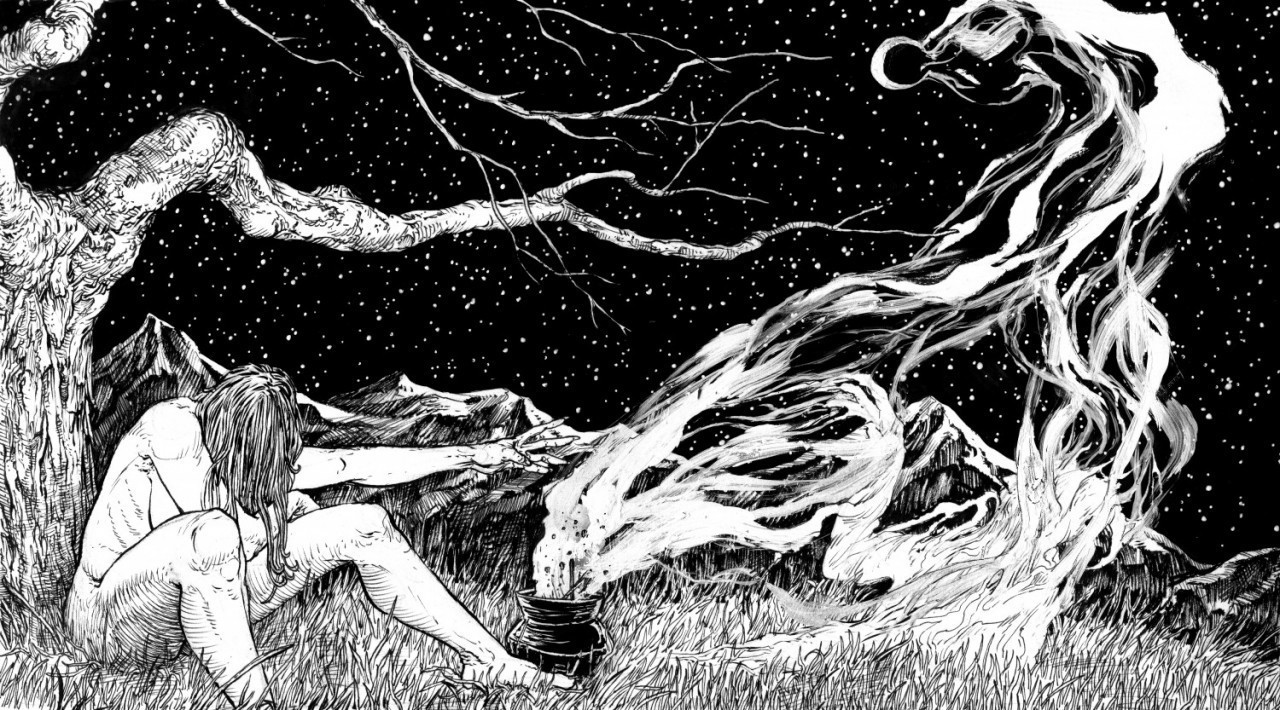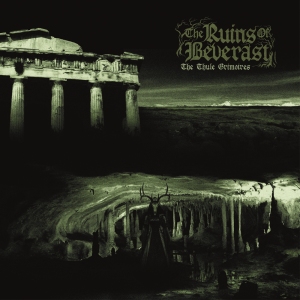The Ruins of Beverast – The Thule Grimoires
The land of Thule is one that has long lain forgotten; a faraway place that lies in the dense and abstract regions of the world, a place that is unreachable by modern humanity and one that is used in literary texts and music to describe the unattainable. For The Ruins of Beverast, Thule could be seen to be a mystical and ice-covered land and these songs (Grimoires, or magical texts) are the keys to unlock the horrifying secrets that lie beneath the surface of its crumbling temples. A world in which a civilisation rises up to defeat those who would stand to destroy the Earth for their own gain with the help of hibernating Gods that have been buried in the deepest oceans and under mountains of ice. The spiritual aspect of Alexander von Meilenwald’s creation is wrought through ritual drum patterns and vocals that echo with gothic textures, chants that are dredged from the underworld and an atmosphere that is as cloying as it is fantastical.
The ability of von Meilenwald (the sole recording member of the band) to twist the expectations of black metal is something that he has been doing for almost twenty years and while The Ruins of Beverast sit somewhere in that musical realm, the band has long abandoned the usual elements of the genre. The Thule Grimoires is drenched in absurdly heady low-end that pulls you closer to the swirling abyss that is created in “Anchoress in Furs” or “Kromlec’h Knell,” while both songs feature quite beautiful clean vocals that stop you in your tracks on first listen. The album’s concept is based around a war committed by people who have left behind all aspects of humanity and who are being pushed back by spiritual practitioners who join forces with the power of nature to take back what was once theirs. Lyrically, the former track is somewhat of a ritualistic inspired piece which speaks of grotesque dances and hands raised to the sky, laden with gold in supplication to a higher power while the latter stages of the song takes in curious chants and a spoken word section which evokes a moment lost to time, a ceremony to bring about change and a prayer for renewal.
Moving on from the tribal beats of 2017s Exuvia, The Thule Grimoires builds on the unusual compositional constructions of past works and moves The Ruins of Beverast into a new state of being — that of a creator at the height of their powers, unafraid to push themselves into new territories or bring new influences into an already well-established sound. Each record from the band is something different and The Thule Grimoires is no exception. Its post-punk sounds and gothic tendencies push against monolithic black metal and deep doom structures and clean vocals are used to disarming affect. The narrative of the album is also incredibly complex with songs that are used as divinations for the elders of Earth to take hold and to overrule those who would strip its resources. Using a somewhat arcane process through sacraments, ritual dance and sermons, serves to push the idea that nature is the true deity on Earth and there are those who would bind themselves to it through magic in order to save humankind from the vast wastelands of ice and snow that we see in the world of The Thule Grimoires.
“Ropes Into Eden” begins The Thule Grimoires on curious, bending guitar progressions that pushes the opening onto strange pathways immediately, the song twisting von Meilenwald’s rasped vocals into an otherworldly chant before the song steps back into industrial, echoing strikes. Strange calls from the deepest of oceans bubble to the surface as the oldest of Gods rises above the waves so that they may join the quest to overthrow the intruders on their world. It’s a dramatic beginning and one that sets out the record to elevate itself above more straightforward styles of black metal. There is deep thought, texture and myth included in The Thule Grimoires which will take more than one listen to even be able to come close to understanding what the ideas and themes truly are. Metaphors layer upon each other as striations in the earth and signal shift as “Ropes Into Eden” steps back into calmer pastures with a wonderful clean vocal line that feels as much a prayer as it does a call for guidance.
The rousing opening of “The Tundra Shines” uses synthesised horns that are distorted from their usual ecclesiastical roots to bring about a sense of holiness, albeit one that is far removed from its foundations, to adapt itself to the new world where perhaps religious tendencies have taken on a new form. This different style of worship is rooted in the most extreme northlands where the frozen world has gained power and has begun to creep further south into the habitable zone where our story continues. “Kromlec’h Knell” is another song which features cleanly sung sections and in doing so the record moves itself forward with a new purpose – the track is centered on these old beasts, or gods, rising from the depths to join the fight while knowing that there is no way to return should the reasons for waking them from slumber be false. The monolithic standing stones of the title will in turn vibrate and send shockwaves through the ground should that be the case and it is a powerful, cinematic image indeed.
The Ruins of Beverast are incredibly clever in creating whole worlds that can be seen through their songs as is the case with “Anchoress in Furs,” a highlight of the album from the outset. The dissonant inflections of the guitars play off a feminine vocalisation that creates an esoteric aura before von Meilenwald’s harsh vocal segues into the song. Clean vocals are given space once again as the voice of worshippers while the deeper registers call to mind the rumbling cracks in the earth from whence the Gods are rising. It’s a beautiful contradiction as anger and hope vie for dominance in an arena where darkness has overtaken all that can be seen.
“Deserts to Bind and Defeat” closes The Thule Grimoires on a fourteen-minute journey of discovery. This behemoth of a song starts slowly with clean vocals lamenting the final stages of the voyage to destroying all that has been wrought upon the Earth. The doomier aspects of the song are manifested in sorrowful guitar leads and simpler tones that allow room for introspection before the voice the voice switches to one that rages against the old systems and offers up their body to the beasts of old. The surreal landscapes of The Ruins of Beverast’s music are entrenched in shadows and indecipherable to most and so The Thule Grimoires is exquisite in the way that it allows for a distinctly personal approach to understanding the text, as much as one can, in order to decide just who wins the battle in this alien world.
Listen and purchase here.

